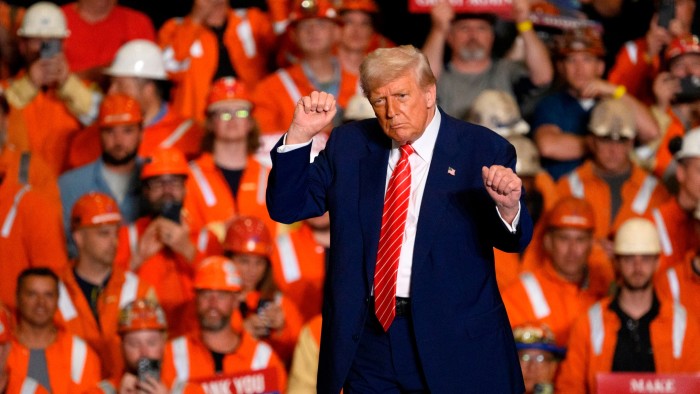Unlock the White House Watch newsletter for free
Your guide to what Trump’s second term means for Washington, business and the world
A year ago when the presidential race between Donald Trump and Kamala Harris was heating up, a veteran mergers and acquisitions adviser told me that if the Republican candidate won, many on Wall Street would eventually long “for the return of Lina Khan”.
The top rainmaker was flagging his concerns that Trump’s antitrust policies would make it even harder to get deals approved than under Joe Biden’s progressive head of the Federal Trade Commission, the US competition watchdog.
Twelve months on, many mergers and acquisitions bankers argue that this has turned out to be the case. They say deal approvals have become more politically charged than under Khan, who was accused by bankers and lawyers in her time in office of using M&A approval procedures to influence public policy on matters beyond preserving competition.
Since Trump’s return to power, dealmaking has collapsed in the US, partly because of policy upheaval in areas such as tariffs but also because of the uncertainty and politicisation of getting transactions approved. Roughly 10,900 deals were announced in the three months to June 30, according to LSEG data. That was the lowest quarterly total since early 2015, excluding the pandemic-affected second quarter of 2022.
Rather than being based on pure market analysis, dealmakers say merger reviews have increasingly started to reflect partisan agendas on issues ranging from “America First” nationalism to the eradication of diversity, equity and inclusion policies. “I have been working on multiple deals where I have people inside the White House telling me what I can and can’t do,” said a top dealmaker involved in transactions unrelated to the government. “It’s a level of intrusion I have never experienced before.”
Few dealmakers will criticise the administration on the record for fear of retribution. But Nippon Steel’s acquisition of US Steel is an example cited by transaction experts. During his 2024 campaign, Trump denounced the Japanese company’s acquisition of US Steel as a threat to American manufacturing. Yet, upon resuming office, he approved the deal after forcing a “golden share” structure on the buyer — essentially giving the government veto rights over strategic decisions.
Advisers warn this sets a precedent: future foreign takeovers may hinge on political bargaining just as much as a ruling on competitive effects. And more generally in M&A, non-traditional factors are coming into play in the approvals process.
“Transacting parties need to be prepared for regulatory scrutiny, even if the risk is considered low. In the current global environment, politics or other exogenous factors can easily come into play, often in unexpected ways,” corporate law firm Wachtell said in a memo about deals and politics.
A senior PR adviser who has navigated sensitive transactions adds: “CEOs are struggling to make sense of what the government wants . . . Most are waiting on the sidelines for greater clarity. Those who need to do a deal are seeking help to sell it in a way that will be well received by the administration.”
Dealmakers have told me this sometimes means taking a cautious stance on issues unrelated to a transaction, such as diversity, equity and inclusion matters.
“Many companies still want to remain committed to DEI, but they are asking for our advice to scrub all references to DEI so they won’t be targeted by the FTC or other regulators,” says one consultant to chief executives on deals.
One rainmaker on Wall Street adds: “The system is becoming totally political and in some cases personal.”
Current policymakers argue politicisation of M&A approvals did not begin with Trump’s second term. They say Khan and former Department of Justice antitrust division head Jonathan Kanter pursued a progressive agenda under Biden in challenging tech megamergers and private equity transactions. But the once-narrow remit of competition policy has widened further. The FTC, for example, convened a workshop on July 9 on whether consumers have been exposed to false or unsupported claims about “gender-affirming care” for minors and the potential harms consumers may be experiencing.
By treating such matters as antitrust concerns, regulators signal that deals are subject to considerations far beyond price and market share. Corporate counsels caution that this risks eroding the impartiality that underpins US merger policy.
“We’re seeing a chilling effect,” says one dealmaker. “Clients hesitate to launch cross-border transactions because they fear hidden political hurdles — golden shares, ideological carve‑outs or cultural mandates.”
